A prominent human rights activist, formerly a supporter of North Korea, spoke to reporters about the country Thursday at a symposium in South Korea, telling them that, based on his studies, he believes it is “impossible to find the whereabouts of all nuclear weapons in North Korea.”
Kim Young-hwan added that he did not believe North Korea would ever agree to giving up all of its nuclear weapons even if it were possible to find them all and hand them over, echoing the concerns of defectors and other experts on the communist Kim regime.
His analysis also follows the publication of an NBC News report claiming to have produced a CIA document showing that the American intelligence community is also skeptical that Kim Jong-un would ever agree in good faith to give up his nuclear weapons.
In a press briefing Wednesday, a senior State Department official told reporters that the Trump administration would settle for no less than “CVID – complete, verifiable, irreversible denuclearization.”
“In order for a summit to be successful, the North Koreans have to do things that they have not done before,” the unnamed official stated. The official was briefing reporters on a “working dinner” between Secretary of State Mike Pompeo and senior North Korean envoy Kim Yong-chol, held in New York City.
“In bilateral talks, North Korea will yield to the U.S. in many areas. It may accommodate 80 to 90 percent of the U.S. demands for closure of its nuclear test site, suspension of nuclear tests, disabling of nuclear facilities and ICBMs and extensive nuclear inspections,” Kim Young-hwan told the audience at the Seoul symposium where he spoke, according to Yonhap.
“Even if those demands are all met, it is impossible to find the whereabouts of all nuclear weapons in North Korea,” he warned.
He added that there is evidence that Kim Jong-un would be interested in allowing international private corporations to invest in North Korea, but having foreigners invest in the country may make Pyongyang “see its continued possession of nuclear weapons as especially necessary for its policy of reform and opening.”
Kim Jong-un appears to be receiving significant pressure from its largest trading partner and closest ally, China, to open up economically. A group of North Korean politicians, including both local and national officials, have spent weeks in China studying how the Communist Party there opened itself up to foreign investment while continuing to repress any political opposition. Kim Jong-un has visited Communist Party leader Xi Jinping twice this year – the only known trips Kim has made abroad as head of his country. Chinese officials and state media have repeatedly demanded that the United States invest economically in North Korea publicly.
Kim Young-hwan’s assessment that a full denuclearization of North Korea is “impossible” echoes concerns expressed by Thae Yong-ho, a former senior North Korean diplomat who defected to the South and published a book this month on his experiences working for the Kim regime.
“The final destination that the North is headed for is not to completely dismantle its nuclear weapons program, but become a nuclear weapons state covered by the paper called denuclearization,” he said in remarks this month. To Kim Jong-un, he argued, nuclear weapons are “a sword and a shield for eternal prosperity, prosperity and happiness for generations to come. … He will never give them up.”
Thae concluded that Kim would advocate for “sufficient” denuclearization – that is, a strategy that would temporarily satisfy Washington’s desire to see the nuclear program shut down but not one that makes it impossible for the North Koreans to resume their weapons research should they choose to at a later date. He also warned that the North Korean people, who are taught from childhood that the Kim family are gods, will not take easily to denuclearizing.
Kim Jong-un’s regime has insisted it is interested in the “full denuclearization of the Korean peninsula,” which skeptics have interpreted as a policy that would remove American assets from the region, not necessarily end the North Korean program. Following a meeting between South Korean officials and their counterparts in Pyongyang in March, an unnamed Seoul official told Yonhap that Kim remarked during their dinner that denuclearization was father Kim Jong-il’s “dying wish.”
“Chairman Kim said that even denuclearization could be among the agenda items for talks between North Korea and the U.S.,” the official reportedly said. “What drew our attention, in particular, is that he made clear that achieving denuclearization is his father’s dying wish and that it has not been changed at all.”
As a gesture of goodwill, the North Korean regime invited international journalists to the destruction of its lone nuclear testing site, Punggye-ri, last week. Pyongyang explicitly banned nuclear weapons experts from joining the journalists, making it impossible for any expert to assess how much the explosions at the site damaged it or whether it could be rehabilitated after the shutdown ceremony. Experts citing satellite imagery also doubted whether Punggye-ri was functional at all following the nation’s sixth nuclear test in September, which reportedly caused a major collapse in one of the tunnels.

COMMENTS
Please let us know if you're having issues with commenting.